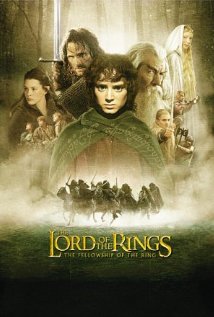 The Lord of the Rings: The Fellowship of the Ring (2001, PG-13)
The Lord of the Rings: The Fellowship of the Ring (2001, PG-13)
Rarely do we spare the time, effort, and expense to watch a movie in the theater, but back in 2001 we ventured into the cold of a Massachusetts winter, in my eagerness to see what the filmmakers had made of one of my all-time favorite books (and Porter's eagerness to see New Zealand, one of his all-time favorite countries, the setting for the film).
I was prepared to be disappointed, as I've yet to find a movie more appealing than the book on which it is based. I was not prepared to be bored. I don't bore easily, but this film succeeded: I couldn't wait for the three hours to be over.
Nine years later I decided it was time to give the film another chance. Whether I like it or not, this version has entered the popular consciousness, and for most people, The Lord of the Rings IS the movie. Having recently re-read the book, I ordered the first of the trilogy from Netflix, determined to watch with a more open mind.
This time I was able to see a few elements in the movie's favor. The artists are better visualizers than I am: I'm usually eager to get on with the story and don't spend the time necessary to get a good picture of the scene, no matter how well described; for the same reason, I don't bother, when reading silently, to figure out the pronunciation of difficult words and names. In this sense, the movie made the setting more real to me, and from my (more careful) recent reading of the book I think they did a fair job. I know they tried to be true to the story.
I've also begun to give movie-makers more slack when it comes to faithfulness to the book. I've come to realize that the movie medium simply is not good at producing the kind of depth and completeness that a book can, and very often events must be telescoped or otherwise changed to tell the story on film. For this reason I was willing to put up with at least some of the many deleted and altered scenes.
On the other hand, it's not right to change the very nature of the characters. The most grievous offense I noted in 2001 was what the movie did to the character of Aragorn, and his relationship with Arwen. The second viewing only strengthened that conviction. Frankly, the movie’s Aragorn is a wimp, with none of the power, strength of character, and knowledge of his heritage and destiny so clearly portrayed in the book. And Arwen, though in the book she is both ancient and wise, is not a warrior, and does not rescue Frodo and bring him to Rivendell, peculiar and unnecessary additions made in the movie.
Goodness is extraordinarily difficult to show on film. I have yet, for example, to see a movie that portrays Jesus as anyone one might care to listen to, let alone follow or die for. In fact, he mostly seems to be played a lot like Aragorn. The Fellowship of the Ring’s effort results in making the characters appear more stoned than spiritual. If the expression can be forgiven when talking about hobbits and elves, the characters don’t seem human enough: they are so other-worldly as to be unreal.
So I was disappointed, but why was I bored? I find The Lord of the Rings so exciting and compelling that I’ve lost track of the number of times I’ve read the book. Each time I pick it up, I find something new, inspiring, or simply delightful. Why was the movie boring? Primarily because it was 90% battles and chase scenes. Substitute cars for horses, and guns or light sabers for swords, and it is the same as hundreds of other movies and television shows. Oftentimes I felt caught in the middle of the kind of video game I don’t even like watching.
My tolerance for fights and chases is extremely low: I’m always thinking, “Can we get this over with and go on to the real action, please?” And, no, I don’t mean romance and the “chick flick” kind of action, which I find at least as dull. Conversations, reflections, revelations, mysteries, character development, growth and discovery—that’s what makes a story interesting for me. The Fellowship of the Ring has it all aplenty, but the movie does not. Therein lies the problem.
But hey, the scenery was great.
Would I recommend the movie to anyone? I don't know. If it leads people to read The Lord of the Rings who otherwise would not, that would be a good thing. In my opinion it's one of the greatest books written in recent history—maybe even ever, but I'm not qualified to make that sweeping a judgement. Another reason to promote the film may be that it tells a much better story than most films now available, and therefore deserves credit by default.
I'm not convincing myself. So much of what is great about the book is simply not there in the movie at all. There's a deep, strong, spiritual dimension to the book—wrestling with issues of good, evil, temptation, free will, responsibility, duty, friendship, honor, faithfulness, love, joy—that the movie lacks. Is there any point in getting a mere surface—and therefore false—view of the story?
I'd love to hear from those of you who enjoy the movie version. What do you like? What makes it a good movie for you? Do you see the spiritual qualities that I find absent in the film? If you've also read the book, how would you compare the two versions?


